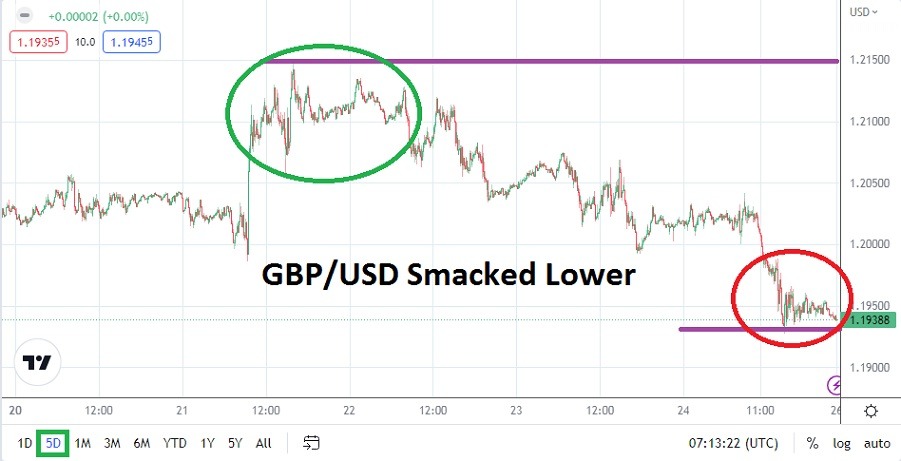[ad_1]
The GBP/USD slumped on Friday to short-term lows as optimism for a sustainable reversal higher seemingly fades via behavioral sentiment.
The GBP/USD went into the weekend around the 1.19390 ratios having experienced a rather strong exhibition of selling on Friday. Having been able to show the ability to trade above the 1.20000 level most of the week, the GBP/USD sunk through support levels suddenly, as optimism for a sustainable short-term reversal seemed to vanish.
Economic data from the U.S. is a large part of the fundamental problem causing downward price action in the GBP/USD. After sustaining a solid bullish run higher for nearly four and half months, the GBP/USD has run into brisk selling momentum since early in February. While growth numbers from the U.S. came in slightly weaker than expected on Thursday, inflation statistics again came in slightly higher than anticipated and this certainly created headwinds for the GBP/USD.
The U.S. Federal Reserve is caught in a nasty web of problems. While inflation in the States remains stubborn, there are signals from corporations showing they are worried about profits moving forward over the next year and they are braced for a recession.
The problem for the Federal Reserve is the potential of ‘stagflation’, meaning economic growth will be weak, but inflation will remain a problem. Over the mid-term, the rhetoric from the Federal Reserve may remain intent on raising interest rates. The GBP/USD is certain to be affected by this inflation sentiment and questions regarding if the worst of the ‘news’ has been digested in Forex, and the surging USD has been witnessed is causing nervousness.
- Without any major economic reports due this coming week, behavioral sentiment is likely to take center stage and support levels for the GBP/USD will need to be monitored.
- Bullish speculators who suspect the GBP/USD has been oversold will want to see the 1.20000 ratio challenged and highs sustained above this level.
Having gone into the weekend achieving a weekly low and coming within sight of the previous week’s lows, the GBP/USD may be perceived as having been oversold. However, speculative trading is likely to flourish this week as the GBP/USD tests technical ratios. If current short-term support and resistance levels hold, the entire week of trading for the GBP/USD could highlight rather choppy conditions within the lower elements of its price range. A low of roughly 1.19150 was seen on the 17th of February and if this monthly low is proven vulnerable, trading will grow additionally nervous.
The speculative price range for GBP/USD is 1.18490 to 1.20850
A range between 1.19300 and 1.20100 should be monitored by traders. If the GBP/USD suddenly falls below the 1.19300 ratio and begins to set its sights on the 1.19200 mark this could set off more selling. If price action is sustained lower and no buying surge is demonstrated it could certainly cause a retest of lows seen in early January.
The bearish trend of the GBP/USD should not be treated with disrespect. While traders may believe the GBP/USD has been oversold, momentum upwards has been difficult to take hold of. Incremental lower support levels on Friday saw the GBP/USD cascade to fresh lows and nervous sentiment remains seen in Forex, not only among the GBP/USD currency pair.
Contrarians who believe a reversal higher will start to develop suddenly should be careful. The technical question for bullish speculators is where support levels will start to prove strong and create durable reversals higher. Certainly, the 1.19000 mark seems too low for the GBP/USD but if this depth is hit, traders should expect swift and dangerous conditions to ensue. If the worst of the economic data has been seen and the U.S. Federal Reserve suddenly becomes more worried about growth problems compared to stubborn inflation, then buying could ensue in a large way. However, this is not likely to happen this week. This means GBP/USD traders looking for upside should remain cautious and willing to use narrow targets that look for limited upside momentum near-term.

[ad_2]
